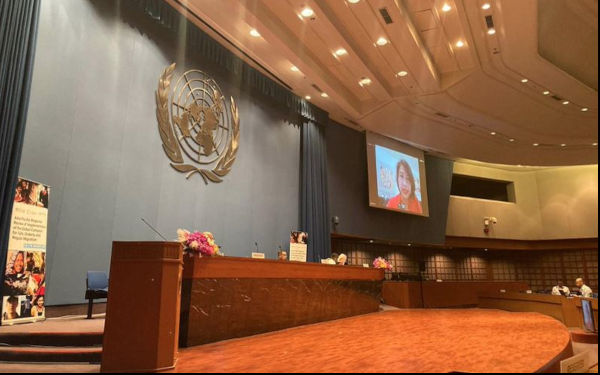Throughout 2019, there are over 65 million international migrants in the Asia-Pacific, and migrants from ESCAP countries live outside of their home country, making up nearly 40 percent of all migrants in the world. The same goes for 46 million migrants in Asia-Pacific countries who moved to other countries within the region.
The Asia-Pacific Regional Review of Implementation of the Global Compact for Safe, Orderly and Regular Migration calls for Asia Pacific countries to collaborate to create supporting policies that side with migrants as they are sometimes left with little or no institutional or legal support due to the irregularity of migration within the region. As a result, often, migrants are vulnerable to various forms of abuse, social and economic exclusion, as well as exploitation which are intensified during the pandemic – endangering their human rights.
Therefore, support for migrants is highly crucial because when it is well-maintained, international migration is an important catalyst for sustainable development, as “no one is left behind.” which is a central reference to target 10.7 to facilitate orderly, safe, regular and responsible migration and mobility of people. For example, migration brings positive changes to societies and economies, where countries of origin are benefited from migrants’ remittances and from the produced links between countries of origin and destination.
As a city and local governments association, UCLG ASPAC is also highly engaged in thematic fields such as migration itself, in the efforts of nurturing sustainable development. On December 18th 2020, Dr. Bernadia Irawati Tjandradewi, Secretary General of UCLG ASPAC brought forth recommendations to ensure well-managed migration policies during the third multi-stakeholder consultations in preparation for this year’s review.
On 12th of March, at the virtual intergovernmental meeting organised by the Economic and Social Commission for Asia and the Pacific (ESCAP) and the Regional United Nations Network on Migration for Asia and the Pacific in Bangkok, Dr. Bernadia Irawati Tjandradewi highlighted once again how local governments play an important role for strengthening the community context creating policies since migrants live and work in urban and other local environments. For example, working conditions can be monitored, services extended, and local governments can also ensure that relations with other community members be forged for better social cohesion. This will also be beneficial for women migrant workers as they are often working in more informal sectors and do not have the social protection and labor contracts in place.
“For local governments to achieve this (effective migration policies) however, is the need of enabling environments, and that local governments should be involved in migration policy processes as we are often not given sufficient resources and authority to support migrants, particularly as migration is also quite intense here in the Asia-Pacific region,”
During this virtual meeting, Mayor of Subang Jaya, Malaysia, Ms. Noraini Roslan also expressed the crucial role of local government in supporting migrants.
“Malaysia allows migrants the access to public amenities related to health, and also education particularly for children migrants. Efforts to integrate migration through participation in community programs, celebrating their festivities and cultures, handouts during the COVID-19 pandemic and also allowing opportunities for small businesses,”
In conclusion, city and local governments, as the branch of governments closest to the communities need to be more heavily involved in policy making related to international migration and this year’s review is a good momentum to call for collaboration with other stakeholders to further strengthen this global compact.
For further information on the Asia- Pacific Regional Review Global Compact for Safe, Orderly and Regular Migration please visit : https://www.unescap.org/news/first-regional-review-global-compact-safe-orderly-and-regular-migration-concludes-asia-and











